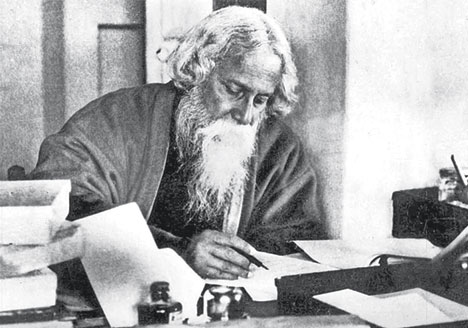
After compiling all the songs of Rabindranath Tagore in a digital archive, Purbachal resident Purnendu Bikash Sarkar is now set to unveil his next project — an archive of recitations of Tagore's poems.
The archive, which will be officially launched on August 28, will contain 3,500 poems recited by various artistes. “A total of 245 artistes, from India and Bangladesh, have lent their voice to the collection, he says.
Poems from all of Tagore’s 57 poetry compilations will feature in the archive. Each will include information on where the poem was first printed, when it was composed and if it has been set to tune as well. Of the 3,500 poems, we get 430 also as songs. We have included existing recordings of the songs wherever copyright was not a problem like a song apiece by Debabrata Biswas, Kanika Bandyopadhyay and Subinoy Roy. About 110 songs had to be recorded afresh.
Sarkar has also included the 103 English translations Tagore did of his poems for Song Offerings. The English recitations have been done mostly by Biplab Ganguly, Sugata Bose and Krishna Bose.
Most of Tagore’s poems, Sarkar says, were written either when he was between 32 and 44 years old or late in life, aged between 66 and 80 years. While Gitanjali, for example, written at the age of 49, has 89 of the 158 poems set to tune in his later compilations, like Nabajatok, Snejuti, Akashpradip, Arogya, Prohasini and Prantik, there are no songs. But his progress as a poet is noticeable with the middle age producing romantic works and his maturest work coming in later years in Sesh Lekha, Snejuti, Prantik or Shyamoli.

Of his two back-to-back projects, the eye specialist feels the second took more of his time and resources. “In 2006, when we launched Gitabitan Archive, it contained 1,500 songs all of which were with His Master’s Voice (HMV). We did not find any recording of 300 songs. So we gave only lyrics and information on those. In 2011, for the second edition, we found another 150 as HMV let us use some Hindusthan Records songs of which they owned the copyright. We got a few more recorded by artistes like Aditi Gupta, Debarati Som and Prabuddha Raha. The only significant artiste we missed was K.L. Saigal as Hindusthan Records did not allow us to include his songs.”
But for the poetry archive, he started from zero. “We searched for a year but did not find recordings of any more than 100 poems. We had to record the rest of 3,500 poems. Nor has much research been done about poems, unlike in case of Tagore’s music. So gathering information about individual poems also proved an uphill task.” All this took four years.
Other than elocutionists like Bratati Bandyopadhyay and Sovon Sundar Bosu, he got acclaimed singers to recite. The list includes Swagatalaxmi Dasgupta, Indrani Sen and Sraboni Sen. “I coaxed even Dwijen Mukherjee of HA Block, who happens to be my patient, to recite Neel noboghoney ashad gogoney. Dignitaries in other fields like historian Sugata Bose, his mother Krishna Bose and FE Block resident Satyam Roychowdhury, the managing director of the Techno India group, are also part of the project.
Though the poetry archive will not come out from Saregama, which produced his earlier venture, it has a link in the form of S.F. Karim, the music company’s veteran marketing manager, reciting a poem. A bulk of the recitation has been done by Sarkar’s wife Barnali. He could also include 15 poems recited by Tagore himself as their copyright has expired.
There are 5,000 recordings with some poems being recorded by multiple artistes. Gogone goroje megh, for instance, is recited by 11 artistes.
The collection will be available in a pen drive. “Initially we had planned to bring out a DVD but our survey showed that the DVD drives of most people’s computers are little used and ill-maintained. So we will bring out just a handful in DVDs. An app is also being developed which will let customers download songs of their choice or take membership to stream the songs for a specific period. The software will remain on our cloud,” he informed.
Sarkar has not yet decided how much the pen drive would be priced but says it should be less than Rs 2,000. A website has been launched called rabindrakobita.org where pre-release orders are being taken at a discount.

His only regret is not being able to gain access to recordings of All India Radio. They have recitations by doyens like Sambhu Mitra. “I also could not include Sankha Ghosh. His album of four Tagore poems titled Ekti Roktim Morichika that came out in the late 60s is still protected by copyright. Neither did he agree to record afresh as his voice is no longer what it was. As for Soumitra Chatterjee, I am still hopeful.”
None of the artists charged a paisa. “All I had to spend was on studio bookings and music instruments, he says. Even that bill has run up to Rs 11 lakh. I have earned enough from my medical profession. My aim is not monetary profit. This is my contribution to keep Tagore’s poems alive in a generation which does not read much.”
"Sarkar is a doctor who does more than treat patients. We have seen the kind of diligence and dedication that went into his Gitabitan Archive. There is no prescription as to how a poem should be read. So listening to multiple interpretations will help would-be elocutionists."
— Sankha Ghosh
"Bengalis have a bad reputation of not being conscious of history. Recently a few projects like this have been taken up that dispels that reputation. Poetry is mainly an audio medium. It is lifeless unless it is read out. While the printed form presents one facet, a variety of recitation of the same work will present many."
— Pabitra Sarkar











